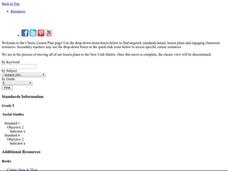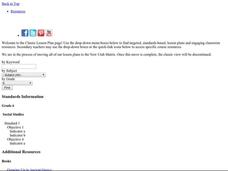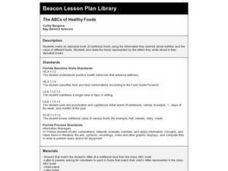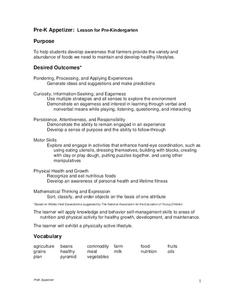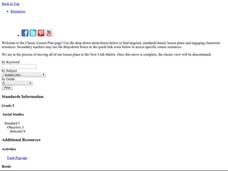Curated OER
Creeping and Crawling Observing Mealworms and Earthworms
Students observe the inherited traits in earthworms and mealworms. In this organisms lesson plan, students view a live mealworm and earthworm on a tray and identify the body parts. Students measure the worms and observe the behavior....
Curated OER
Paint's Family Tree
Learners sort and classify the genetic traits of horses. In this heredity and genetics lesson, students read dialogue in a skit in which specific physical traits of several horses are described and a horse family tree is created....
Curated OER
Bison on the Plains
Fifth graders explore U.S. geography by reading assigned text about American Indians. In this migration lesson, 5th graders identify the differences between Native Americans and European settlers who traveled through middle America in...
Curated OER
King Cotton
Fifth graders explore the cotton plant. In this cotton lesson, 5th graders research the process of growing cotton. Students explore the economic and cultural differences in the states that grew cotton for trade and industry.
Curated OER
Now You Have It, Now You Don't
Sixth graders compare corn-based shipping peanuts to Styrofoam shipping peanuts. In this hands-on environmental awareness lesson, 6th graders try dissolving two different types of packing peanuts in water.
Curated OER
Hand Washing: I can handle it!
Sixth graders examine microorganisms. In this germs instructional activity, 6th graders observe and record data on the positive and negative aspects of microorganisms. Students complete activities, view a film, and explore...
Curated OER
Microbe Experimentation
Sixth graders conduct a microbe experiment. In this microbe lesson, 6th graders develop an experiment with micro-organisms, complete the associated worksheet, and complete a table showing the results.
Curated OER
Ancient Mediterranean Lands: Greece
Sixth graders explore the processes developed by the Ancient Greeks, particularly olives and olive oil. In this Greek culture and inventions lesson, 6th graders read an article and design a flap book. Students collect the olive oil...
Curated OER
From Foraging to Farming
Students experience the difficulty that goes along with foraging for food. In this lesson on the importance of modern agriculture, students simulate how there simply is not enough food and water for everyone when agricultural means are...
Curated OER
Ancient Civilizations
Sixth graders complete map-work in order to understand the progression of hunter-gatherer societies. In this hunter-gatherer instructional activity, 6th graders label maps with the Equator, the Tropics, and the vegetation. They complete...
Curated OER
The ABCs of Healthy Foods
First graders, after reviewing the food pyramid, look for fat, sugar, and salt in food.
Curated OER
Mystery "F & V's"
Fourth graders explore agriculture by reading assigned text about produce. In this fruits and vegetables lesson, 4th graders identify the healthy benefits of consuming fresh produce and what minerals and vitamins they contain. Students...
Curated OER
Pick a Better Snack and Act
Students make healthy choices. In this healthy living mini-unit, students make healthy lifestyle choices through hands-on activities, songs and movement. This mini-unit includes lessons on the food pyramid, fruits, vegetable, and staying...
Curated OER
Pre-K Appetizer
Students understand there are healthy and not healthy food choices. In this food pyramid lesson plan, students learn to make healthy choices by playing a traffic light game. Students recognize raw foods from the farm may not be ready for...
Curated OER
Vegetable Twister
Second graders study the changes in organisms over time. In this Life Science lesson, 2nd graders explore how living things react to changes in the environment. Students identify the basic needs of living things.
Curated OER
World Hunger
Students research the causes and effects of world hunger on children. In this world hunger lesson, students discuss causes and effects of hunger around the world and research a specific area affected by hunger. Students prepare a...
Curated OER
Where Does It Come From?
Fifth graders explore free trade. In this free trade lesson, 5th graders discover which commonly found products are made in the United States and which originate from other countries. Students explore which countries are better at...
Curated OER
Favorite Foods
First graders explore healthy eating habits by reading assigned text in class. In this food choice lesson, 1st graders discuss their own favorite foods and identify the healthier choices they could eat to make them feel better. Students...
Curated OER
Hand Washing: I Can Handle It
Third graders explore biology by viewing a germ video in class. In this sanitation lesson, 3rd graders identify the importance of washing hands and complete several on-line germ safety activities. Students view a video in class titled...
Curated OER
Food Needs, Food Wants
Students explore wants and needs. In this family budgeting activity, students play the Food Money game to help them distinguish between food wants and needs. Students discuss their impressions of the game and food budgets.
Curated OER
Yeasts and Molds: Food Science, Bacteria, Fungi
In this lesson students will consider the characteristics and nature of yeast and molds in order to help them understand how these microorganisms affect food production.
Curated OER
Trash Goes To School
Middle schoolers explore solid waste background information. They are presented with a well balanced picture. Students review ideas on how to use solid waste issues in many fields including math, science, English, social studies and home...
Curated OER
Animals and Environments
Students listen to stories and identify animals and their young. In this animals lesson, students view videos about farm animals and create illustrations to show how animal babies change over time. Students discuss...
Curated OER
Exploring Texture In the Garden
Students explore the garden environment. In this garden environment lesson, students investigate the needs and parts of a plant. Students discover the differences between fruits and vegetables while creating their own garden.





